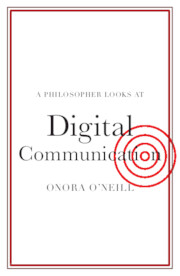Book contents
- A Philosopher Looks at Digital Communication
- A Philosopher Looks at
- A Philosopher Looks at Digital Communication
- Copyright page
- Contents
- Preface
- Part I Complex Communication
- Part II Norms and Standards in a Connected World
- 5 Duties and Rights 1: Freedom of Expression
- 6 Duties and Rights 2: Rights to Privacy
- Part III Politics and Connectivity
- Notes
- Some Suggestions for Further Reading
- Index
6 - Duties and Rights 2: Rights to Privacy
from Part II - Norms and Standards in a Connected World
Published online by Cambridge University Press: 20 January 2022
- A Philosopher Looks at Digital Communication
- A Philosopher Looks at
- A Philosopher Looks at Digital Communication
- Copyright page
- Contents
- Preface
- Part I Complex Communication
- Part II Norms and Standards in a Connected World
- 5 Duties and Rights 1: Freedom of Expression
- 6 Duties and Rights 2: Rights to Privacy
- Part III Politics and Connectivity
- Notes
- Some Suggestions for Further Reading
- Index
Summary
The right to privacy is the other human right that bears on communication, although not only on communication. Its formulations in the Universal Declaration and in the European Convention are very similar and quite dated. Although privacy is often discussed in conjunction with other informational requirements, such as transparency, confidentiality or freedom of information, none of these are counted as human rights. And once again, concentrating on one specific right may offer a limited contribution to the complex ethical and epistemic standards that are relevant to communication, and especially to digital communication. Digital technologies raise numerous challenges for privacy, and addressing them is likely to require attention to a wide range of ethical and epistemic norms and standards.
- Type
- Chapter
- Information
- A Philosopher Looks at Digital Communication , pp. 75 - 88Publisher: Cambridge University PressPrint publication year: 2022

